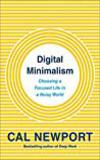
The tycoons of social media have to stop pretending that they’re friendly nerd gods building a better world and admit they’re just tobacco farmers in T-shirts selling an addictive product to children. Because, let’s face it, checking your “likes” is the new smoking.
Digital Minimalism makes a strong claim that modern smartphones and social media are every bit as addictive and dangerous as any number of more well known drugs and that we’d be well put to cut out or at least drastically reduce the amount of digital ‘clutter’ in our lives.
It’s not actually a terrible idea and it actually gave me the push I needed to change a fair few things about how I use technology. I’d already deleted Twitter and Facebook from my phone months ago and only check them on my computer for no more than one time / ten minutes a day (if that). But I still found myself spending far too much time on Reddit and watching YouTube on my phone, as well as on digital card games such as Hearthstone and Eternal. So away went all of those as well.
That being said, while the idea is actually pretty nice, the book itself is fairly week. There are long anecdotes about various famous people with various ideas about solitude, many of which just don’t seem practical in the modern world, not without being a pre-made millionaire. Often I found myself wondering: why is this section even here. And even the good points get made over again. Despite 1/3 of the book being made of notes (when it ended before 70%, I was surprised…), it could have been shorter.
That being said, if you find yourself spending entirely too much time on a phone or particularly scrolling through the same Facebook (etc) newsfeed over and over again… give this a read. Perhaps it will help.
Aside: The section on Amish culture and the comparison to the Mennonites was pretty interesting, if a bit lengthy. I should read more about them, it sounds like an interesting philosophy.
The problem is not electricity; it’s the fact that the grid connects them too strongly to the world outside of their local community, violating the Amish commitment to the biblical tenet to “be in the world, but not of it.”